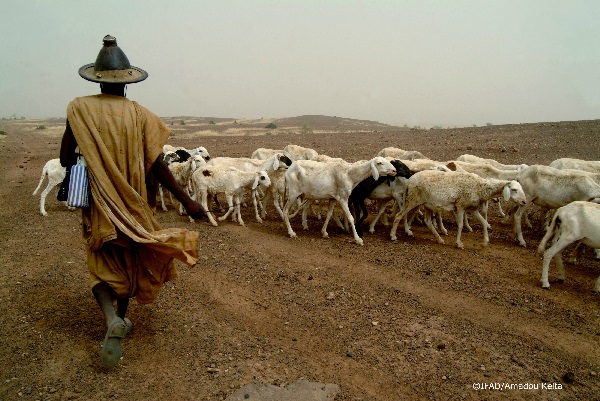 Credit: IFAD/Amadou Keita
Credit: IFAD/Amadou Keita
On Thursday 19 September 2019, the Selection Committee for the European Microfinance Award 2019, organised by the Luxembourg-based European Microfinance Platform (e-MFP), chose the three finalists who will go on to compete for the €100,000 prize: APA, ASKI and FDL.
This year's award, "Strengthening Resilience to Climate Change", has highlighted the initiatives that these three organisations have put in place to increase vulnerable populations' resilience to climate change. Through their initiatives, APA, ASKI and FDL have demonstrated the innovation and dynamism of this most critical area of financial inclusion.
Since mid-March when the award attracted applications from 41 organisations in 27 countries, a rigorous multi-phase evaluation process has been ongoing which culminated in the Selection Committee selecting APA, ASKI and FDL as this year's finalists. The committee was composed of eighteen experts, including members of the e-MFP, Luxembourg's Ministry of Foreign and European Affairs and the Inclusive Finance Network Luxembourg (InFiNe.lu).
Finalists
APA is an insurance company in Kenya that provides index-based insurance to mostly smallholder and subsistence farmers. The agriculture sector is the main source of livelihoods for the majority of Kenyan people. However, climate change is profoundly affecting them due to their low resilience and dependence on rain-fed agriculture, especially through the increased frequencies of flooding and droughts and changing rainfall patterns. APA has responded to this with two products: an Index Based Livestock Insurance (IBLI) and an Area Yield Index Insurance (AYII). IBLI insures pastoralists against forage (food for grazing livestock) deterioration due to drought, resulting in livestock deaths, whilst AYII protects farmers against the damage to the insured growing crops due to excessive rainfall, flood, frost, hail damage, excessive heat wave, windstorm, uncontrollable pest and diseases and drought and pays out claims to farmers when the average yield in their area falls below a set level, regardless of the actual yield on each client's farm.
ASKI is a microfinance institution (MFI) in the Philippines that builds clients' resilience to climate change by focusing on disaster preparedness at the institutional and community level. Besides frequent earthquakes, volcanic eruptions and tsunamis, the Philippines is also significantly affected by climate change, including increasing frequency and severity of typhoons, rising temperatures, rising sea levels, flooding and landslides. As a consequence, many of ASKI's clients have experienced severe damages or total loss of their produce or assets, leading to bankruptcy and default. ASKI has increased disaster preparedness in several ways, including the setup of a Disaster Risk Reduction team the publication of a guidebook on Disaster Risk Reduction and Business Continuity Planning for MFIs, the establishment of a resiliency fund with dedicated client savings intended for disaster relief and recovery, the creation of rehabilitation loans and bridge loans for heavily affected clients, with a grace period and lower interest rate and fees, and enrolment of clients in micro-insurance products to mitigate risk.
Financiera Fondo de Desarrollo Local (FDL) is an MFI in Nicaragua that has responded to the consequences of climate change by providing local interventions to increase not only clients' resiliency, but also the resilience of the ecosystem. Climate change impacts the agricultural sector in particular due to irregular cycles of droughts and floods, increasingly extreme temperatures and initial desertification, reducing yields and lowering farmers' capacity to pay. FDL's "Green Microfinance-Plus Programme" reduces transaction costs, combines technical assistance with payments for ecological services and adapted loans for water-harvesting and irrigation systems and incorporates silvopastoral agroforestry models for the intensification of cattle production based on integrated and sustainable natural processes, including pasture improvement, seed management and diversification and soil conservation. To achieve this, FDL offers three products: loans for green microfinance in the coffee/cacao highlands, loans for the "Dry Corridor" to foster mitigation and adaptation practices and loans for agroforestry-related income diversification activities.
After the announcement of the three finalists, the Luxembourg Minister for Development Cooperation and Humanitarian Affairs, Paulette Lenert, said: "Over the ten editions of the European Microfinance Award, there's perhaps never been one as relevant and urgent as this. Climate change will increasingly affect all people in all countries – but it is the poor in low-income countries who are the most vulnerable, and for whom resilience is most important. We're delighted to see this fascinating and diverse array of initiatives, and especially those of the three outstanding finalists, who are each leading by example in this most important task".
The winner will be chosen from the three finalists by a High Jury and announced on the 21 November 2019 at a ceremony hosted at the European Investment Bank in Luxembourg, during European Microfinance Week.








